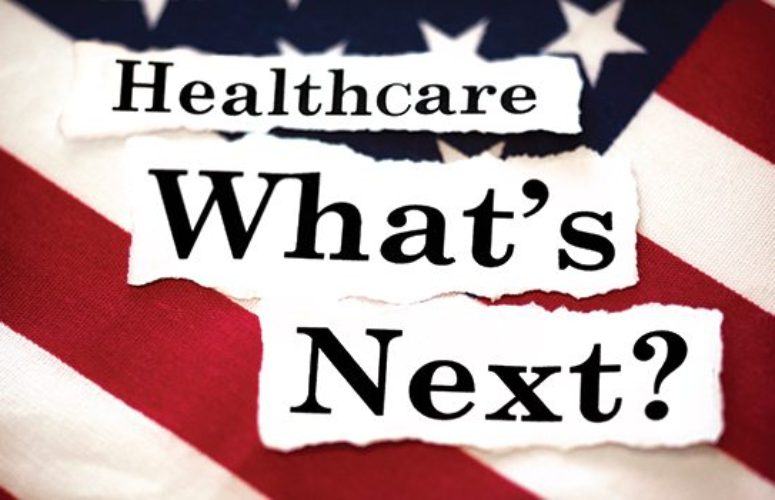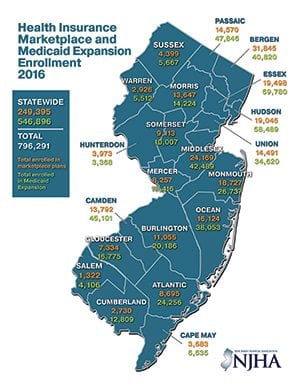
ACA Repeal Could Unravel Our Healthcare Safety Net
Here’s why we can’t let that happen.
By Betsy Ryan, President and CEO, New Jersey Hospital Association On Mar 29, 2017There are countless stories of real people, with real healthcare worries, that have been helped by the Affordable Care Act. But the potential for harm, if the ACA is repealed, extends far beyond the 22 million Americans and 800,000 New Jersey residents who receive health insurance under the ACA. What transpires in Washington, DC, has a tremendous impact on the healthcare safety net here in New Jersey.
The impact could be felt in reduced coverage protections for all healthcare consumers, in financial hits that jeopardize our healthcare facilities and in the loss of federal matching dollars that could punch a hole in our state budget – with potential reverberations for all residents.
Those of us in the healthcare community – the state’s second largest employment sector – are watching the debate over whether to “repeal, replace or repair” the ACA with the hope that Washington’s solution does no harm to an industry that is responsible for $22.7 billion in economic impact in New Jersey and 17 percent of our nation’s gross domestic product.
Over the last seven years, the ACA has begun to change the way our healthcare system operates. The healthcare community has moved aggressively since the law’s passage in 2010 to implement the component parts by enrolling uninsured individuals into Medicaid or an insurance plan; adopting more preventive health measures to keep people out of the hospital; and investing greatly in improved healthcare quality to prevent hospital readmissions and increase the value of the care we deliver.

Insuring more people, and providing quality care in the right setting, is essential for us to reduce healthcare costs and insurance premiums over time.
That’s why I was heartened when I first heard President Trump say that no one will lose coverage under a replacement plan. There’s a difference between healthcare coverage and healthcare access. Healthcare coverage ensures individuals have an insurance package that will allow them to have a primary care doctor and receive routine and preventative care. Healthcare access, on the other hand, would return us to the pre-ACA reality where uninsured residents used hospital emergency rooms – the most expensive of healthcare settings – for their care. That doesn’t provide value to anyone – not the patient, not our healthcare providers and not other health insurance customers.
New Jersey law requires all of our hospitals to provide care to all people in all settings, regardless of their ability to pay. We’re proud of this commitment to caring for all of our communities here in the Garden State, but it comes with a steep cost. Prior to the ACA, hospitals provided more than $1 billion annually in charity care services to 1.3 million uninsured New Jerseyans. In exchange, hospitals received partial reimbursement from the state. The state kicked in $650 million for those charity care costs prior to the ACA’s coverage mandate, but that funding stream has now been cut to $302 million in the current state budget, with an even deeper $50-million cut proposed for next year.
Which brings our state to a critical juncture when it comes to healthcare. If the ACA replacement plan adds to New Jersey’s uninsured rate, or if Medicaid redesign limits federal funding to our state, it will be a striking blow to our healthcare delivery system. Our patients provider community – hospitals, health systems, nursing homes and others – absorbed $1.8 billion in cuts over an eight-year period to help pay for the ACA. Those cuts were offset because providers were caring for many more people with health insurance. If the coverage under the ACA erodes, our healthcare system will be staggered by a one-two punch: billions of dollars in cuts, plus the loss of payments from insurance companies.
Hospitals will provide the care needed, but it will require a reinvestment of state dollars into the charity care pool to adequately pay hospitals for that care. If the reinvestment doesn’t occur, many New Jersey hospitals will struggle financially. It’s a simple, but alarming, formula: Fewer patients with insurance + less money to pay for charity care = a fiscal crisis for New Jersey’s healthcare community.
The ACA has generated a great deal of debate, but the facts show that it has reduced the uninsured burden, it has slowed the growth in healthcare costs and it has set our healthcare system on a course that emphasizes good value. If we lose its coverage provisions, we’ll all need a stronger safety net to catch us.
About the Author: Elizabeth “Betsy” Ryan, Esq., is president and CEO of the New Jersey Hospital Association, a not-for-profit healthcare trade organization. based in Princeton.
Related Articles:






